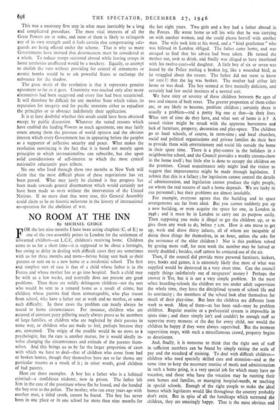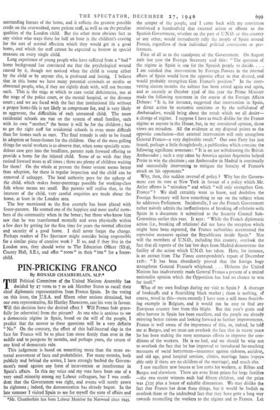NO ROOM AT THE INN
By MICHAEL GEDGE
FOR the last nine months I have been acting chaplain (C. of E.) to one of the two assembly points in London for the settlement of unwanted children—an L.C.C. children's receiving home. Children come to us for a short time—it is supposed to be about a fortnight, but owing to delay in dealing with difficult cases they are sometimes with us for three months and more—before being sent back to their parents or sent on to a new home or a residential school. The first and simplest sort of case is that of a child whose father is in the Forces and whose mother has to go into hospital. Such a child may be with us a few weeks, and normally does not present any great problems. Then there are mildly delinquent children—not the sort who would be sent to a remand home as a result of crime, but children whose parents find them unmanageable, who play truant from school, who have a father out at work and no mother, or some such difficulty. In these cases the problem can nearly always be traced to home circumstances. For instance, children who are accused of constant petty pilfering nearly always prove to be members of large families, or children who are neglected by their parents in some way, or children who are made to feel, perhaps because they are, unwanted. The origin of the trouble would be no news to a psychologist, but the cure is another matter, for it would ideally in- volve changing the circumstances and attitude of the parents them- selves. And this brings us to by far the larger proportion of cases with which we have to deal—that of children who come from bad or broken homes, though they themselves have not so far shown any particular trauma as a result of it ; in other words, good children of bad parents.
Here are three examples. A boy has a father who is a habitual criminal—a confidence trickster, now in prison. The father left him in the care of the prostitute whose flat he leased, and she handed the boy over to the police. The mother, who ran away years ago with another man, a titled crook, cannot be found. The boy has never been in one place or in one school for more than nine months for the last eight years. Two girls and a boy had a father abroad in the Forces. He wrote home to tell his wife that he was carrying on with another woman, and she could please herself with another man. The wife took him at his word, and a " kind gentleman" who was billeted in London obliged. The father came home, and was enraged to find that his advice had been taken. He turned the mother out, took to drink, and finally was alleged to have interfered with his twelve-years-old daughter. A little boy of six or seven was found by the Police trailing a broken leg, like a wounded bird, as he struggled about the streets. The father did not seem to know (or care ?) that the leg was broken. The mother had either left home or was dead. The boy seemed at first mentally deficient, and certainly had few social instincts of a normal sort.
We have sixty or seventy of these children between the ages of two and sixteen of both sexes. The greater proportion of them either are, or are likely to become, problem children ; certainly there is usually a problem—and a pretty big one at that—in their lives. What sort of time do they have, and what sort of home is it ? A casual visitor might be struck with the apparent barrenness and lack of furniture, property, decoration and play-space. The children go to local schools, of course, in term-time ; and local churches, social and political organisations and private families do their best to provide them with entertainment and social life outside the home in their spare time. There is a play-centre in the holidays in a neighbouring school, and the Council provides a weekly cinema-show in the home itself ; but little else is done to occupy the children on the premises. Casual acquaintance only might lead the visitor to suggest that improvements might be made through legislation. I submit that this is a fallacy ; for legislation cannot control the details of administration, and legislation cannot produce the right people, on whom the real success of such a home depends. We are lucky in our personnel ; but their problems are almost insoluble.
For example, everyone agrees that the building and its space arrangements are far from ideal. But you cannot suddenly put up a new building, or even acquire the space for one, in London in 1946 ; and it must be in London to carry out its purpose easily. Then supposing you make it illegal to get the children up, or to give them any work to do, before 7 a.m. How is one nurse to get up, wash and dress thirty infants, all of whom are incapable of doing these things for themselves, in an hour, unless she asks for the assistance of the elder children ? Nor is this problem solved by getting more staff, for next week the number may be halved or nearly doubled ; besides, staff cannot be conjured out of the air.
Then, if the council did provide more personal furniture, lockers, toys, books and games, it is extremely likely that most of what was supplied would be destroyed in a very short time. Can the council supply things indefinitely out of ratepayers' money ? Perhaps the answer is Yes, but it is not a very simple problem. In the most select boarding-schools the children are not under adult supervision the whole time, they have the disciplined system of school life and its continuity ; the members of the school look after themselves for much of their play-time. But here the children are different from week to week. Most of them—as has been said—may be problem children. Regular routine or a prefectorial system is impossible in spare time ; and there simply isn't and couldn't be enough staff to supervise every moment of the day for every child, nor would the children be happy if they were always supervised. But the moment supervision stops, with such a miscellaneous crowd, property begins to deteriorate.
And, finally, it is nonsense to think that the right sort of staff in sufficient numbers can be found by simply raising the scale of pay and the standard of training. To deal with difficult children— children who need specially skilled care and attention—and at the same time to keep the necessary routine of meals and administration in such a home going, is a very special job for which many have no vocation, and those who have the vocation may be running their own homes and families, or managing hospital-wards, or teaching in special schools. Enough of the right people to make the ideal homes which legislators would like throughout the country probably don't exist. But in spite of all the handicaps which surround the children, they are amazingly happy. That is the most obvious and
outstanding feature of the home, and it reflects the greatest possible credit on the overworked, most patient staff, as well as on the peculiar qualities of the London child. But the other most obvious fact to any visitor who stays there for half an hour is the children's craving for the sort of normal affection which they would get in a good home, and which the staff cannot be expected to bestow in special measure on every single child.
Long experience of young people who have suffered from a " bad " home background has convinced me that the psychological wound caused by it, though not noticed when the child is young either by the child or by anyone else, is profound and lasting. I believe that in this home we have many potential criminals or misfits or abnormal people, who, if they are rightly dealt with, will not become such. This is the stage at which to cure social deficiencies, not at the stage of the police court, or the mental hospital, or the divorce court ; and we are faced with the fact that institutional life without a proper home-life is not likely to compensate for, and is very likely to aggravate, the difficulties of each unwanted child. The more residential schools are run on the system of small families, each with its own " mother," the better it will be for the children ; but to get the right staff for residential schools is even more difficult than for homes such as ours. The final remedy is only to be found in adoption or foster-homes for the children. One of the most galling things for social workers is to observe that, when some specially scan- dalous case gets into the headlines, parents rush forward offering to provide a home for the injured child. Some of us wish that they rushed forward more at all times ; there are plenty of children waiting for them! On the whole at present the foster system seems better than adoption, for there is regular inspection and the child can be removed if unhappy. The local authority pays for the upkeep of the child, which makes foster-parentage possible for working-class folk whose means are small. But parents will realise that, in the interests of the child, very careful enquiries are made about the home, at least in the London area.
The boy mentioned as the first example has been placed with foster-parents. He seemed one of the happiest and most useful mem- bers of the community when in the home ; but those who know him saw that he was transformed mentally and even physically within a few days by getting for the first time for years the normal affection and security of a good home. I shall never forget the change. Perhaps readers of The Spectator might consider being responsible for a similar piece of creative work ? If so, and if they live in the London area, they should write to The Education Officer (SS.9),
County Hall, and offer "room" in their "inn" for a foster- child.































 Previous page
Previous page